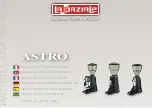
19
en
Additional safety instructions for grinding and
cutting off operations
Use only wheel types that are recommended for your
power tool and the specific guard designed for the
selected wheel.
Wheels for which the power tool was
not designed cannot be adequately guarded and are
unsafe.
The grinding surface of the centre depressed wheels
must be mounted below the plane of the guard lip.
An
improperly mounted wheel that projects through the
plane of the guard lip cannot be adequately protected.
The guard must be securely attached to the power tool
and positioned for maximum safety, so the least amount
of wheel is exposed towards the operator.
The guard
helps to protect operator from broken wheel frag-
ments and accidental contact with wheel.
Wheels must be used only for recommended applica-
tions. For example: do not grind with the side of cut-off
wheel.
Abrasive cut-off wheels are intended for
peripheral grinding, side forces applied to these wheels
may cause them to shatter.
Always use undamaged wheel flanges that are of correct
size and shape for your selected wheel.
Proper wheel
flanges support the wheel thus reducing the possibility
of wheel breakage. Flanges for cut-off wheels may be
different from grinding wheel flanges.
Do not use worn down wheels from larger power tools.
Wheels intended for larger power tools are not suita-
ble for the higher speed of a smaller tool and may
burst.
Additional safety warnings specific for abrasive
cutting off operations
Do not “jam” the cut-off wheel or apply excessive pres-
sure. Do not attempt to make an excessive depth of cut.
Overstressing the wheel increases the loading and sus-
ceptibility to twisting or binding of the wheel in the cut
and the possibility of kickback or wheel breakage.
Do not position your body in line with and behind the
rotating wheel.
When the wheel, at the point of oper-
ation, is moving away from your body, the possible
kickback may propel the spinning wheel and the
power tool directly at you.
When wheel is binding or when interrupting a cut for any
reason, switch off the power tool and hold the power tool
motionless until the wheel comes to a complete stop.
Never attempt to remove the cut-off wheel from the cut
while the wheel is in motion otherwise kickback may
occur.
Investigate and take corrective action to elimi-
nate the cause of wheel binding.
Do not restart the cutting operation in the workpiece. Let
the wheel reach full speed and carefully reenter the cut.
The wheel may bind, walk up or kickback if the power
tool is restarted in the workpiece.
Support panels or any oversized workpiece to minimize
the risk of wheel pinching and kickback.
Large work-
pieces tend to sag under their own weight. Supports
must be placed under the workpiece near the line of
cut and near the edge of the workpiece on both sides
of the wheel.
Use extra caution when making a “pocket cut” into exist-
ing walls or other blind areas.
The protruding wheel
may cut gas or water pipes, electrical wiring or objects
that can cause kickback.
Safety warnings specific for sanding operations
Do not use excessively oversized sanding disc paper. Fol-
low manufacturers recommendations, when selecting
sanding paper.
Larger sanding paper extending beyond
the sanding pad presents a laceration hazard and may
cause snagging, tearing of the disc, or kickback.
Safety Warnings specific for Polishing operations
Do not allow any loose portion of the polishing bonnet or
its attachment strings to spin freely. Tuck away or trim
any loose attachment strings.
Loose and spinning
attachment strings can entangle your fingers or snag on
the workpiece.
Safety warnings specific for wire brushing
operations
Be aware that wire bristles are thrown by the brush even
during ordinary operation. Do not overstress the wires by
applying excessive load to the brush.
The wire bristles
can easily penetrate light clothing and/or skin.
If the use of a guard is recommended for wire brushing,
do not allow any interference of the wire wheel or brush
with the guard.
Wire wheel or brush may expand in
diameter due to work load and centrifugal forces.
Additional safety warnings
Use elastic spacers/liners when these are provided with
the grinding/sanding accessory.
Make sure that the application tools are mounted in
accordance with the manufacturers instructions. The
mounted application tools must be able to rotate freely.
Incorrectly mounted application tools can become loose
during operation and be thrown from the machine.
Handle accessories carefully and store them according
to the manufacturer’s instructions.
Damaged accesso-
ries can form cracks and break off during operation.
When using application tools with a threaded insert, take
care that the thread in the application tool is long enough
to hold the spindle length of the power tool. The thread
in the application tool must match the thread on the spin-
dle.
Incorrectly mounted application tools can loosen
during operation and cause injuries.
Beware of any concealed electric cables, gas or water
conduits;
check the working area with a metal detec-
tor, for example, before commencing work.
Use a stationary extraction system, blow out ventilation
slots frequently and connect a residual current device
(RCD) on the line side.
When working metal under
extreme operating conditions, it is possible for con-
ductive dust to settle in the interior of the power tool.
The total insulation of the power tool can be impaired.
Do not rivet or screw any name-plates or signs onto the
power tool.
If the insulation is damaged, protection
against an electric shock will be ineffective. Adhesive
labels are recommended.
Always work using the auxiliary handle.
The auxiliary
handle ensures reliable guidance of the power tool.
Before putting into operation, check the mains connec-
tion and the mains plug for damage.
3 41 01 066 06 0.book Seite 19 Freitag, 23. Dezember 2016 9:09 09
















































